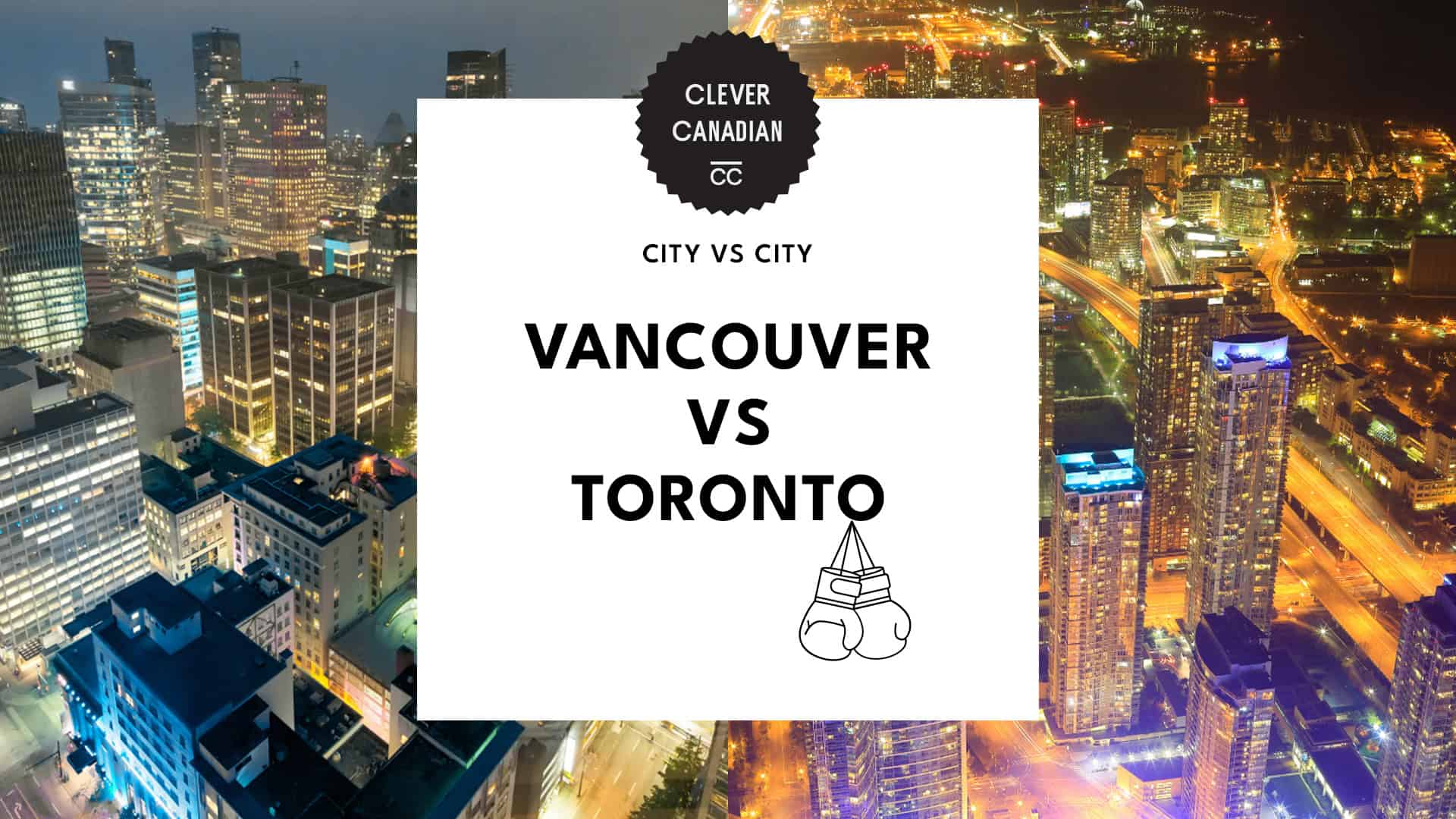Categories > Guides and Tips

Vancouver vs Toronto: Which is the best city for international students?
- Educational Opportunities for International Students in Toronto vs. Vancouver
- Tuition Fees in Toronto vs. Vancouver
- Immigration for International Students in Toronto vs. Vancouver
- Cost of Living in Toronto vs. Vancouver
- Job Opportunities in Toronto vs. Vancouver
- Public Transportation in Toronto vs. Vancouver
- Accommodations in Toronto vs. Vancouver
- Demographics in Toronto vs. Vancouver
- Culture in Toronto vs. Vancouver
- Safety in Toronto vs. Vancouver
- Vancouver vs Toronto: How They Stack Up
Trying to decide if Toronto or Vancouver is better for you as an international student? Well, let’s see how these two stack up regarding essential aspects that will make a better experience of living in a foreign land.
If you’re looking for the best educational experience, Toronto and Vancouver both offer quality education. Although, the former is home to Canada’s highest-ranking university, the University of Toronto.
But if you want a more affordable option, Vancouver universities are cheaper than Toronto by 26.77%.
Overall, your decision will be based on your preferences. To help you out, we’ll compare their cost of living, educational opportunities, diversity, safety, and more. Read on!
Educational Opportunities for International Students in Toronto vs. Vancouver

Overall, Toronto has better educational programs for international students and the variety and quality of education.
The University of Toronto ranks 26 in the QS World University Rankings, having over 27,536 international students enrolled. This number is higher than the University of British Columbia, ranking 46 and having over 15,399 international students.
Plus, according to the International Student Survey, 93% of international students are satisfied with their educational experience in Canada.
You can get easily persuaded by their world-class universities and programs.
Here are a few universities in Vancouver and Toronto:
| Vancouver | Toronto |
| University of British Columbia (UBC) QS Rank: 46 | University of Toronto QS Rank: 26 |
| Langara College | York University QS Rank: 494 |
| Simon Fraser University (SFU) QS Rank: 298 | Ryerson University |
| Columbia College | George Brown College |
| Kwantlen Polytechnic University | Centennial College |
Both cities offer a variety of programs that stretch from arts to business to sciences.
And competitively speaking, Toronto provides a higher quality of education and more experience handling many international students.
Tuition Fees in Toronto vs. Vancouver
Vancouver offers more affordable tuition for international students since its average minimum is $11,000. This figure is slightly less expensive than Toronto’s $15,000 tuition minimum.
Thus, Vancouver is 26.77% cheaper than Toronto in the minimum tuition fee of universities or colleges.
Tuition fees for international students in Vancouver can range from $11,000 to $50,000. Although, the total costs depend on the institution, course, program, and level of education.
Meanwhile, tuition fees in Toronto can range from $15,000 to $30,000 annually.
Plus, if you’re aiming for law or medicine, the costs are bound to be more expensive!
That said, international students can explore external scholarship opportunities from their home countries, international organizations, foundations, and private donors that support students studying in Canada.
Here’s a list of possible scholarships from the Canadian Government that you can apply for in both Vancouver and Toronto:
| Canadian Government Scholarships | |
| Vancouver | Toronto |
| Canada-ASEAN Scholarships and Educational Exchanges for Development (SEED) | Canada Graduate Scholarships – Master’s Program |
| Canada-CARICOM Skills Training for the Green Economy Scholarships | Emerging Leaders in the Americas Program (ELAP) |
| Canada-China Scholars’ Exchange Program | Global Affairs Canada Scholarships |
| Banting Postdoctoral Fellowships | Vanier Canada Graduate Scholarships |
| Emerging Leaders in the Americas Program | Canada-CARICOM Leadership Scholarships Program |
| Organization of American States Academic Scholarship Program | Canada-Chile Leadership Exchange Scholarship |
| Study in Canada Scholarships | |
| Vanier Canada Graduate Scholarships |
On the other hand, there are private scholarships that are available in some universities. Here are some options:
| Private Scholarships | |
| Vancouver | Toronto |
| University of British Columbia: • The International Major Entrance Scholarship • Outstanding International Student Award | University of Toronto • Lester B. Pearson International Scholarships • University of Toronto Scholars Program • Faculty-Specific Scholarships |
| Langara College • Langara Scholarships in recognition and support of outstanding achievement | Ryerson University • International Student Scholarships • FCAD International Scholarships, |
| Columbia College • Entrance and Academic Scholarships | Seneca College • Seneca International Entrance Scholarship • Government of Canada Scholarships |
| Simon Fraser University • SFU Undergraduate Scholars and Graduate Entrance Scholarships, | |
| Kwantlen Polytechnic University • The President’s Scholarship • Merit Scholarship, | |
| University Canada West • Entrance scholarships • Scholarships for Academic Excellence | |
| Vancouver Island University • International Undergraduate Student Regional Entrance Scholarship |
Immigration for International Students in Toronto vs. Vancouver

Vancouver and Toronto (toronto vs vancouver for immigrants) both have favourable immigration systems and programs for international students.
Here are some options for international students:
| Immigration Options | Details | Where it is Offered |
| Study Permit | International students must obtain a study permit from Immigration, Refugees and Citizenship Canada (IRCC) to study in Vancouver or Toronto. | Both cities |
| Post-Graduation Work Permit (PGWP) | This permit allows international students to work in Canada for a period equal to their study program, up to three years. Thus, providing you with some leverage in gaining Canadian work experience. | Both cities |
| Canadian Experience Class (CEC) | International students who have completed their studies and gained Canadian work experience may be eligible for the CEC. It allows individuals with Canadian work experience to apply for permanent residency. | Both cities |
| British Columbia Provincial Nominee Program (BC PNP) | This offers immigration courses for international students. The BC PNP considers factors like work experience, education, and job offers in British Columbia. | Vancouver |
| Ontario Immigrant Nominee Program (OINP) | Designed to attract skilled workers, international students, and entrepreneurs to settle in Ontario. | Toronto |
You could easily look up more scholarship programs or directly inquire about universities for opportunities that will fit your aim and background. The ones on the list only scratch the surface of the many possible ways out there!
Cost of Living in Toronto vs. Vancouver

The cost of living in Toronto is 0.2% more expensive than in Vancouver for international students.
According to LivingCost, both cities are part of the top 3% of most expensive cities in the world — Toronto ranked 4th in Canada, while Vancouver is ranked 5th.
The cost of living is essential when deciding where to study, especially for international students. It matters a lot more compared to if you were a resident. Some necessary expenses are rent, utilities, food, and transportation.
Let’s compare the average monthly expenses in Vancouver and Toronto:
| Vancouver | Toronto | |||
| Cost of living | One person | Room for 4 | One person | Room for 4 |
| Total with rent | $2344 | $5237 | $2348 | $5264 |
| Without rent | $863 | $2816 | $912 | $2924 |
| Rent & Utilities | $1480 | $2421 | $1436 | $2340 |
| Food | $565 | $1478 | $542 | $1424 |
| Transport | $140 | $364 | $244 | $618 |
The overall 0.2% difference between Toronto and Vancouver —Toronto being more expensive — may not seem much until you add all of this into monthly or annual expenses.
So we suggest you have a clear picture of your budget before choosing a city to avoid skipping meals once you get there.
Job Opportunities in Toronto vs. Vancouver

In both Toronto and Vancouver, there are several options international students can choose from, especially with part-time jobs. So they can quickly gain employment without any prior working experience.
According to Statistics Canada, the share of new principal applicant immigrants with Canadian study experience increased from 6% to 38% from 2000 to 2019.
It’s no secret that many international students want a job during their stay, and some need it to help them during their studies.
Here is the minimum wage in both cities to give you an idea of what to expect when applying for a job as an international student:
| Vancouver | Toronto |
| $16.75 an hour | $16.55 an Hour |
Next, let’s take a look at some top job opportunities for international students:
- On-Campus Jobs: You can apply for on-campus positions at universities or colleges. These jobs include working at the library, campus bookstore, student services, or as a research or teaching assistant.
Conveniently, an on-campus job is a great way to earn if you need something that can work around your schedule.
- Off-Campus Jobs: For instance, you can go for industries like retail, hospitality, food services, customer service, and administration.
- Co-op and Internship Programs: These programs allow students to gain hands-on work experience in their field of study.
It involves partnerships with local companies and organizations, so you can take advantage of this and go for a company you want to work for.
- Work-Study Programs: Work-study programs are initiatives by institutions wherein students can work part-time on campus or with community organizations.
As a heads up, research the requirements you’ll need to work, like a work permit. There are different requirements for on-campus, off-campus, and internships.
Although there may be more restrictions for immigrants or international students when it comes to working, at the end of the day, there are still plenty of employers willing to hire you!
Public Transportation in Toronto vs. Vancouver
Vancouver has a more convenient and efficient public transportation system, thanks to its extensive coverage and easy transitions from one transport to the other.
Here’s a quick rundown of the public transportation system in Vancouver and Toronto:
| Vancouver vs. Toronto: Public Transportation Systems | ||||
| Vancouver | Toronto | |||
| TransLink | Includes buses, SkyTrain, SeaBus, and West Coast Express | Toronto Transit Commission | Includes buses, streetcars, and subways | |
| Compass Card | Contactless smart card for fare payment on all TransLink services | PRESTO Card | Contactless smart card for fare payment on TTC services | |
| Concession Fares | Discounted concession fares for students enrolled in eligible institutions | Concession Fares | Offers discounted concession fares for students enrolled in selected institutions | |
| Extensive Coverage | Covers Vancouver, Burnaby, Richmond, Surrey, and other surrounding municipalities | Subway System | It has 4 main lines that connect various neighbourhoods, downtown, and major educational institutions | |
| Student-oriented Services | Includes increased service frequencies during peak hours | Bus and Streetcar Network | Bus and streetcar routes cover the entire city, providing convenient transportation options to reach different areas | |
| Night Bus Service | Provides transportation options during late-night hours |
As you can see, Vancouver’s transit systems cover a wider area and have more convenient means of switching modes of transportation.
Although Toronto has reliable transit, considering the city is two and a half times bigger than Vancouver, the limited area coverage may challenge you to get from points A to B.
Thus, you would have less difficulty navigating the city with the Vancouver transit system.
In addition, Vancouver transit fares are also cheaper than Toronto and lesser with student discounts.
Here’s a short list of price ranges for public transportation in Vancouver and Toronto:
| Vancouver | Toronto | |
| Monthly transit pass (students) | $56-$98 | $116-$134 |
| One-way transit fare | $2.95-$3.00 | $3.10-$3.25 |
| Bike rental (per hour) | $8-$10 | $7-$10 |
Accommodations in Toronto vs. Vancouver

Toronto and Vancouver offer various accommodations for international students at varying prices. But, overall, Vancouver offers more affordable options.
The average price for on-campus housing in Vancouver is $1,100, cheaper than Toronto’s $1,300 average. As for off-campus rentals, Vancouver is also more affordable, with an average of $2,400, while it’s $2,750 for Toronto.
International students have several accommodation options based on their preferences, budget, and lifestyle.
Let’s go through some accommodation options for international students:
- On-Campus Housing: Typically, these are furnished rooms with shared amenities such as common areas, study rooms, and laundry rooms.
- Homestays: It involves living with a local Canadian family in their home. You get to experience Canadian culture firsthand, practice English, and receive support from your host family.
- Off-Campus Rentals: For instance, shared apartments or houses where students rent and share common areas with other tenants.
- Purpose-Built Student Accommodations (PBSAs): PBSAs are privately-owned accommodations for students. These are similar to on-campus housing.
- Renting Apartments or Condos: Some students may opt to rent their apartments or condos in Vancouver. Although this option offers better privacy and independence, it usually has a pricier tag.
As for accommodation costs, Vancouver and Toronto are pretty close to each other.
Here’s a comparison table of their monthly accommodation costs:
| Accommodation | Vancouver | Toronto |
| On-Campus Housing | $700 – $1500 | $800 – $1800 |
| Off-Campus Rentals | $500 – $1500$1800 – $3000 (city proper) | $600 – $1800$2000 – $3500 (city proper) |
| Homestays | $800 – $1500 | $900 – $1800 |
| PBSAs | $800 – $1800 | $800 – $1800 |
The gap is not that big, but Vancouver has cheaper accommodation rates than Toronto, especially with city-proper rentals since you’re closer to necessary establishments.
Demographics in Toronto vs. Vancouver

Toronto and Vancouver both have relatively diverse residents, but the former has more immigrants and minorities in its population. In Toronto, recorded immigrants represent 46% of its people. Meanwhile, there are 41% in Vancouver.
And looking at it from a nationwide perspective, Toronto immigrants represent 35.9% of the immigrant population in Canada.
The demographics of a city play an important role, especially for international students who seek belongingness. On that note, being in a diverse city can help you find a community you feel comfortable with.
For this, we made a table with stats gathered from World Population Review.
| Racial Composition | Vancouver | Racial Composition | Toronto | |
| White | 43.1% | White | 43.50% | |
| Chinese | 20% | South Asian | 13.96% | |
| South Asian | 14% | East Asian | 12.73% | |
| Filipino | 6% | African | 9.60% | |
| West Asian | 3% | Southeast Asian | 8.12% | |
| Korean | 2% | Middle Eastern | 4.03% | |
| Latin American | 2% | Latin American | 3.35% | |
| Black | 2% | Indigenous | 0.83% | |
| Japanese | 1% | Other/Multiracial | 3.88% | |
| Arab | 1% | |||
| Indigenous | 2.40% | |||
| Visible minority | 0.60% | |||
| Multiple visible minorities | 1.90% |
Impressively, Vancouver has over 989,545 immigrants taking up almost 41% of the city’s population. You’ll get to meet people from different places, and the top countries include China, India, the UK, the Philippines, and Hong Kong.
And a fun fact, Vancouver has a large Asian population and a Chinese community. Vancouver’s Chinatown has also made a name for itself, being the second largest in North America and a popular attraction.
Meanwhile, according to a report from Statistics Canada, Toronto takes the cake as the most diverse Canadian city. It’s also considered the top destination for immigrants.
That said, you shouldn’t worry about being the “new kid” in town just because you’re from a different country since both cities have more diverse students than other countries.
Culture in Toronto vs. Vancouver

As an insider scoop on their culture, the city has an impressive arts and music scene, with places like the Vancouver Symphony Orchestra, Vancouver Opera, and Arts Club Theatre Company. You can check out upcoming theatre events to explore more.
And naturally, they host many festivals and events like the Vancouver International Film Festival and Vancouver International Jazz Festival.
Here’s a list of places and theatres that showcase both cities’ cultural experience:
| Cultural Entities in Vancouver | Cultural Centres and Festivals in Toronto |
| • Bill Reid Gallery of Northwest Coast Art • Chinatown • Dr. Sun Yat-Sen Classical Chinese Garden • Vancouver Art Gallery • The Vancouver Symphony Orchestra • Vancouver Opera • Arts Club Theatre Company • Theatre Under the Stars • Bard on the Beach Shakespeare Festival • The Improv Centre | • The Power Plant • Royal Ontario Museum • Ontario Science Centre • Chinatown • The Bata Shoe Museum • Four Seasons Centre for the Performing • The Toronto Fringe Festival • North By Northeast Music & Film Festival • Elgin and Winter Garden Theatre Centre • Toronto International Film Festival • Toronto After Dark Film Festival |
Good news for film-junkies, Toronto is well-known for being a film, television, and digital media center. It even makes a record-breaking $2.5 billion contribution to the Toronto economy.
And it’s only appropriate that there are initiatives to showcase these cultures; fortunately, they organize festivals. Some include the Toronto Caribbean Carnival, Pride Toronto, and the Toronto International Film Festival.
Being immersed in their culture can help you have a better outlook on both cities and appreciate the place more beyond your studies.
Safety in Toronto vs. Vancouver

According to the Canada Crime Index, Toronto has a Crime Severity Index (CSI) of 56.7%, and Vancouver has 90.1%. These are both relatively good, considering Toronto’s population is about four times larger than Vancouver’s.
Also, Vancouver has a safety index of 59.09% which is higher than Toronto’s safety index of 57.53% — a small win for the former.
However, note that both cities get evaluated with different types of crimes; thus, the weight per crime also fluctuates.
To be comfortable enough to study or walk around the city, feeling safe and secure is crucial.
For a breakdown of the Crime Severity Index (CSI) that monitors the severity level of police-reported crime, according to Canada Crime Index, see the table below:

| City | Population | Overall CSI | Violent Crime CSI | Non-violent Crime CSI |
| Toronto | 2,794,396 | 56.7% | 88.3% | 45.2% |
| Vancouver | 675,218 | 90.1% | 98.9% | 86.8% |
To show you the perceived crime comparison level between Toronto and Vancouver, we also sourced information from Numbeo. Do note that below are survey data and are subject to change with more respondents over time.
| Type of Crime | Toronto | Vancouver |
| Level of crime | 46.66% | 42.46% |
| Crime increasing in the past 3 years | 67.11% | 61.58% |
| Worries home broken and things stolen | 36.08% | 34.70% |
| Worries being mugged or robbed | 37.39% | 30.04% |
| Worries attacked | 38.69% | 34.04% |
| Worries being insulted | 42.26% | 38.19% |
| Worries being subject to a physical attack because of your skin color, ethnic origin, gender or religion | 28.15% | 23.16% |
| Problem property crimes such as vandalism and theft | 48.23% | 53.68% |
| Problem violent crimes such as assault and armed robbery | 44.89% | 35.91% |
In addition, international students are bound to walk alone most of the time to go to and from universities and other places. To show the safety rate for walking alone during daylight and night, see the table below:
| Safety | Toronto | Vancouver |
| Safety walking alone during daylight | 74.94% | 80.59% |
| Safety walking alone during night | 52.84% | 56.23% |
Vancouver may be a safer choice when it comes to the crime rates and the nature of crimes; however, nothing beats staying vigilant and being aware of your surroundings no matter where you are.
Vancouver vs Toronto: How They Stack Up
To sum up, both cities are excellent choices for international students who prefer to study in Canada.
Although, technically, Vancouver one-ups Toronto on our list of elements, more is needed to rule out that one is better. Both cities are tied in almost everything, from immigration to job opportunities.
Ultimately, it all comes down to your preference, convenience and lifestyle. Let’s review the different factors and suggestions we have for each city:
| Factors | The Better City | Why |
| Education | Toronto | Toronto ranks higher, and has more international students enrolled. |
| Immigration | Tied | Both have favorable immigration processes and have a large number of international students. |
| Cost of Living | Vancouver | Toronto is more expensive than Vancouver. |
| Job Opportunities | Tied | Employers are open to hiring students. |
| Public Transportation | Vancouver | Has an extensive coverage and is more affordable |
| Accommodations | Vancouver | Vancouver has cheaper rentals, especially in the city proper. |
| Demographics | Toronto | Toronto is more diverse and is a top destination for immigrants. |
| Safety | Vancouver | Vancouver is a safer choice, with cases that mostly revolve around petty crimes. |






